林克妈妈教英语
林克妈妈英语听力直通车1(完整文本)

《林克妈妈的听力直通车1》Topic 1Scene 1 Wake up, sleepyhead.Wake up, sleepyhead. 起床了,小懒虫。
One more minute. 再睡一分钟。
It's time to get up. 该起床了。
It's still early. I want to sleep some more. 还早呢,我想再睡一会儿。
But you move so slowly. 但是你很磨蹭。
Get up, or you'll be late. 起床了,要不就要迟到了。
Ok, but I'm still sleepy. 好的,可我还困着呢。
Scene 2 The alarm clock went off.The alarm clock went off.,Get up right away.闹钟响了,快起床。
Give me five more minutes to snooze. 再让我小睡5分钟。
Mom, it's too late. 妈妈,太晚了,Did you set the alarm clock last night? 昨晚你设闹钟了吗?Yes, I set it for six thirty. 设了呀,我设在6点半了。
Why didn't the alarm go off? 闹钟怎么没响呢?I didn't let it go off. I wanted you to sleep more.我没让它响,我想让你多睡会儿。
Scene 3 I slept like a baby.Did you sleep well last night? 昨晚睡得好吗?Yes, I slept like a baby. 我睡得可香啦。
Did you have a good sleep last night? 昨晚睡得好吗?Yes, I had a very good sleep. How about you?我睡得很好,你呢?How did you sleep last night? 昨晚睡得怎么样?Not very well. I had a bad dream.不太好,做了个噩梦。
林克妈妈英文三字经文档-全
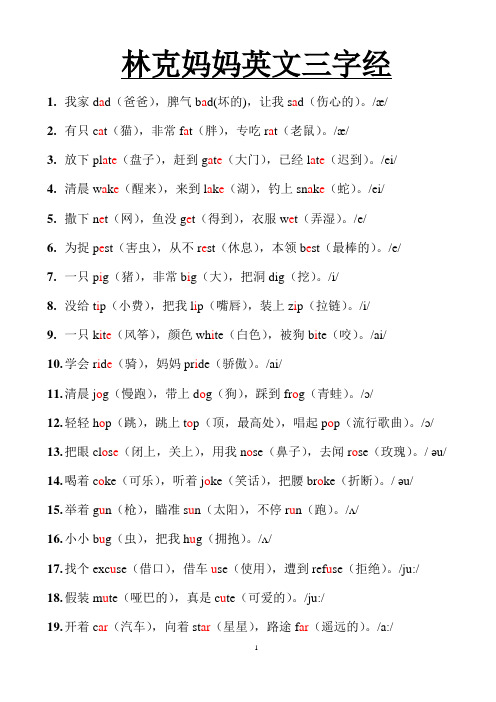
林克妈妈英文三字经1.我家d a d(爸爸),脾气b a d(坏的),让我s a d(伤心的)。
/æ/2.有只c a t(猫),非常f a t(胖),专吃r a t(老鼠)。
/æ/3.放下pl a t e(盘子),赶到g a t e(大门),已经l a t e(迟到)。
/ei/4.清晨w a k e(醒来),来到l a k e(湖),钓上sn a k e(蛇)。
/ei/5.撒下n e t(网),鱼没g e t(得到),衣服w e t(弄湿)。
/e/6.为捉p e st(害虫),从不r e st(休息),本领b e st(最棒的)。
/e/7.一只p i g(猪),非常b i g(大),把洞dig(挖)。
/i/8.没给t i p(小费),把我l i p(嘴唇),装上z i p(拉链)。
/i/9.一只k i t e(风筝),颜色wh i te(白色),被狗b i te(咬)。
/ai/10.学会r i d e(骑),妈妈pr i de(骄傲)。
/ai/11.清晨j o g(慢跑),带上d o g(狗),踩到fr o g(青蛙)。
/ɔ/12.轻轻h o p(跳),跳上t o p(顶,最高处),唱起p o p(流行歌曲)。
/ɔ/13.把眼cl o s e(闭上,关上),用我n o se(鼻子),去闻r o se(玫瑰)。
/ əu/14.喝着c o ke(可乐),听着j o ke(笑话),把腰br o ke(折断)。
/ əu/15.举着g u n(枪),瞄准s u n(太阳),不停r u n(跑)。
/ʌ/16.小小b u g(虫),把我h u g(拥抱)。
/ʌ/17.找个exc u se(借口),借车u se(使用),遭到ref u se(拒绝)。
/ju:/18.假装m u te(哑巴的),真是c u te(可爱的)。
/ju:/19.开着c ar(汽车),向着st ar(星星),路途f ar(遥远的)。
林克妈妈英文三字经文档-全

林克妈妈英文三字经1.我家d a d(爸爸),脾气b a d(坏的),让我s a d(伤心的)。
/æ/2.有只c a t(猫),非常f a t(胖),专吃r a t(老鼠)。
/æ/3.放下pl a t e(盘子),赶到g a t e(大门),已经l a t e(迟到)。
/ei/4.清晨w a k e(醒来),来到l a k e(湖),钓上sn a k e(蛇)。
/ei/5.撒下n e t(网),鱼没g e t(得到),衣服w e t(弄湿)。
/e/6.为捉p e st(害虫),从不r e st(休息),本领b e st(最棒的)。
/e/7.一只p i g(猪),非常b i g(大),把洞dig(挖)。
/i/8.没给t i p(小费),把我l i p(嘴唇),装上z i p(拉链)。
/i/9.一只k i t e(风筝),颜色wh i te(白色),被狗b i te(咬)。
/ai/10.学会r i d e(骑),妈妈pr i de(骄傲)。
/ai/11.清晨j o g(慢跑),带上d o g(狗),踩到fr o g(青蛙)。
/ɔ/12.轻轻h o p(跳),跳上t o p(顶,最高处),唱起p o p(流行歌曲)。
/ɔ/13.把眼cl o s e(闭上,关上),用我n o se(鼻子),去闻r o se(玫瑰)。
/ əu/14.喝着c o ke(可乐),听着j o ke(笑话),把腰br o ke(折断)。
/ əu/15.举着g u n(枪),瞄准s u n(太阳),不停r u n(跑)。
/ʌ/16.小小b u g(虫),把我h u g(拥抱)。
/ʌ/17.找个exc u se(借口),借车u se(使用),遭到ref u se(拒绝)。
/ju:/18.假装m u te(哑巴的),真是c u te(可爱的)。
/ju:/19.开着c ar(汽车),向着st ar(星星),路途f ar(遥远的)。
林克妈妈英语初学者指南

林克妈妈英语初学者指南Learning English as a beginner can be a challenging yet rewarding experience. It opens up a whole new world of opportunities for communication and personal growth. As a mother of a beginner English learner, you may be wondering how to best support your child on this journey. It's important to create a supportive and encouraging environment where your child feels comfortable practicing their English skills.作为一个英语初学者的母亲,您可能会想知道如何最好地支持您的孩子在这段旅程中。
非常重要的是要创造一个支持和鼓励的环境,让您的孩子感到舒适练习他们的英语技能。
One of the first steps in helping your child learn English is to make it a fun and engaging experience. Incorporate games, songs, and interactive activities into their learning routine to keep them motivated and excited about learning a new language. Encourage them to practice speaking English with you and other family members on a daily basis to improve their confidence and fluency.帮助您的孩子学习英语的第一步之一是让它成为一个有趣和引人入胜的体验。
林克妈妈英文三字经
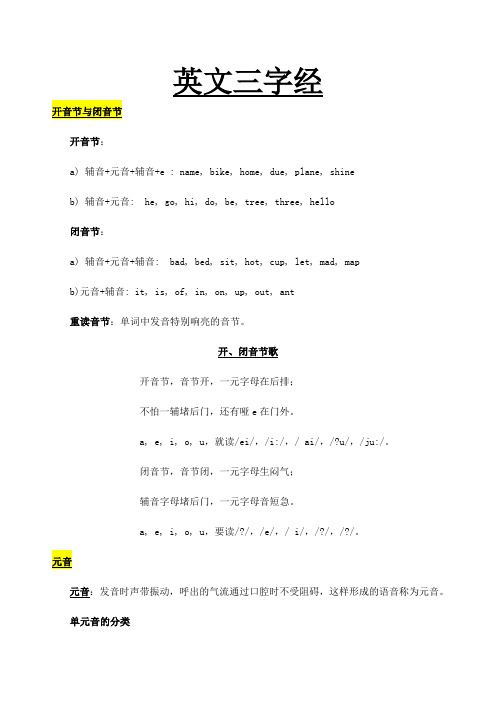
英文三字经开音节与闭音节开音节:a) 辅音+元音+辅音+e : name, bike, home, due, plane, shineb) 辅音+元音: he, go, hi, do, be, tree, three, hello闭音节:a) 辅音+元音+辅音: bad, bed, sit, hot, cup, let, mad, mapb)元音+辅音: it, is, of, in, on, up, out, ant重读音节:单词中发音特别响亮的音节。
开、闭音节歌开音节,音节开,一元字母在后排;不怕一辅堵后门,还有哑e在门外。
a, e, i, o, u,就读/ei/,/i:/,/ ai/,/?u/,/ju:/。
闭音节,音节闭,一元字母生闷气;辅音字母堵后门,一元字母音短急。
a, e, i, o, u,要读/?/,/e/,/ i/,/?/,/?/。
元音元音:发音时声带振动,呼出的气流通过口腔时不受阻碍,这样形成的语音称为元音。
单元音的分类前元音:/ i: /, / i /, / e /, / ? /发音时舌位最高点都在舌前部。
中元音:/ ?: /, / ? /发音时舌位最高点都在中部,舌尖都要轻触下齿或者稍离下齿龈。
后元音:/ ɑ:/, / ? /, / ?:/, / u /, / u: /, /Λ/发音时舌位最高点都在后部,舍身都要后缩,舌尖都要离开下齿龈。
双元音的分类合口双元音:/ ei /, / ai /, / ?u /, / au /, / ?i/牙床从开到合,前一个元音发得较清楚,较长,后面的元音发得较模糊,较短。
集中双元音:/ i? /, / ε? /, / u? /两个元音发音都比较清楚,分别从[i],[e],[u]集中到中元音[?]。
辅音辅音:不论声带振动与否,发音时呼出的气流通过口腔或鼻腔时受到一定的阻碍,这样形成的语音称为辅音。
清辅音:发音时声带不振动的辅音称为清辅音。
浊辅音:发音声带振动的辅音称为浊辅音。
林克妈妈在网易答网友问
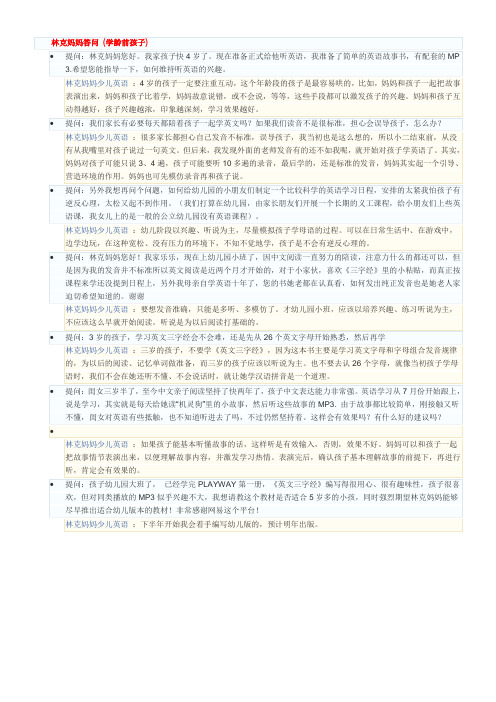
林克妈妈答问(学龄前孩子)∙提问:林克妈妈您好。
我家孩子快4岁了。
现在准备正式给他听英语,我准备了简单的英语故事书,有配套的MP3.希望您能指导一下,如何维持听英语的兴趣。
:4岁的孩子一定要注重互动,这个年龄段的孩子是最容易哄的,比如,妈妈和孩子一起把故事表演出来,妈妈和孩子比着学,妈妈故意说错,或不会说,等等,这些手段都可以激发孩子的兴趣。
妈妈和孩子互动得越好,孩子兴趣越浓,印象越深刻,学习效果越好。
∙提问:我们家长有必要每天都陪着孩子一起学英文吗?如果我们读音不是很标准,担心会误导孩子,怎么办?:很多家长都担心自己发音不标准,误导孩子,我当初也是这么想的,所以小二结束前,从没有从我嘴里对孩子说过一句英文。
但后来,我发现外面的老师发音有的还不如我呢,就开始对孩子学英语了。
其实,妈妈对孩子可能只说3、4遍,孩子可能要听10多遍的录音,最后学的,还是标准的发音,妈妈其实起一个引导、营造环境的作用。
妈妈也可先模仿录音再和孩子说。
∙提问:另外我想再问个问题,如何给幼儿园的小朋友们制定一个比较科学的英语学习日程,安排的太紧我怕孩子有逆反心理,太松又起不到作用。
(我们打算在幼儿园,由家长朋友们开展一个长期的义工课程,给小朋友们上些英语课,我女儿上的是一般的公立幼儿园没有英语课程)。
:幼儿阶段以兴趣、听说为主,尽量模拟孩子学母语的过程。
可以在日常生活中、在游戏中,边学边玩,在这种宽松、没有压力的环境下,不知不觉地学,孩子是不会有逆反心理的。
∙提问:林克妈妈您好!我家乐乐,现在上幼儿园小班了,因中文阅读一直努力的陪读,注意力什么的都还可以,但是因为我的发音并不标准所以英文阅读是近两个月才开始的,对于小家伙,喜欢《三字经》里的小粘贴,而真正按课程来学还没提到日程上,另外我母亲自学英语十年了,您的书她老都在认真看,如何发出纯正发音也是她老人家迫切希望知道的。
谢谢:要想发音准确,只能是多听、多模仿了。
才幼儿园小班,应该以培养兴趣、练习听说为主,不应该这么早就开始阅读。
林克妈妈的少儿英语学习法a_e自然发音修正版

to be late.
听一听(中)
• 把盘里的食物都吃了。 • 但我要迟到了。
• 醒醒,你上学要迟到了。 • 哎呀,我没时间洗脸了,我可不想迟到。
a…I hate to be late
我可不想迟到
ห้องสมุดไป่ตู้
读一读:
name 名字 game 游戏 plane 飞机
背一背(1)
▪ 放下 plate ▪ 赶到 gate ▪ 已经 late
哎呀,我没时间洗脸了,我可不想迟到。
You are going to be late for class Oh, dear, I have no time to wash my face. You are going to be late for class
背一背(2)
Oh, dear, I have no time to wash my face. 醒醒,你上学要迟到了。
I hate to be late.
❖ 清晨 wake I hate to be late.
醒醒,你上学要迟到了。 a…I hate to be late
Oh, dear, I have no time to wash my face.
But I’m going to be late. 哎呀,我没时间洗脸了,我可不想迟到。
Oh, dear, I have no time to wash my face.
听一听(英)
❖ Eat all the food on your plate. ❖ But I’m going to be late.
【精品】音标版林克妈妈幽默小故事L116
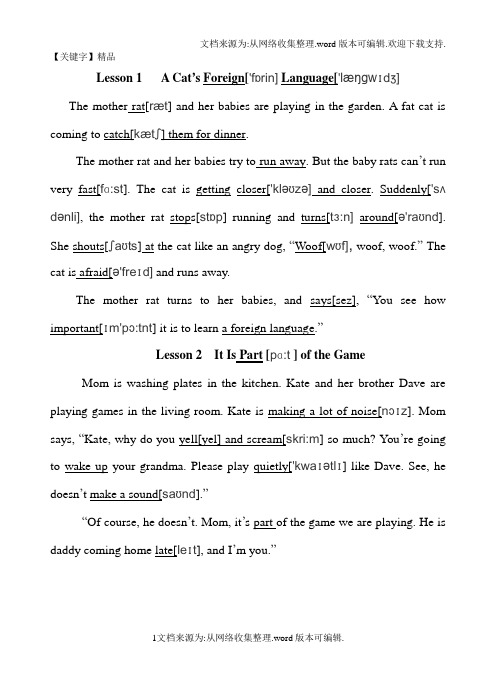
【关键字】精品Lesson 1 A Cat’s Foreign['fɒrin] Language[The mother rat[ræt] and her babies are playing in the garden. A fat cat isThe mother rat and her babies try to run away. But the baby rats can’t runvery The cat is gettingdənli], the mother rat stops[stɒp] running andShe shouts[ʃaʊts] at the cat like an angry dog, ” TheThe mother rat turns to her babies, and says[sez], “You see how] it is to learn a foreign language.”Lesson 2 It Is Part [pɑ:t ] of the GameMom is washing plates in the kitchen. Kate and her brother Dave aresays, “’re going to wake up your grandma. Please play quietly[doesn’”“Of course, he doesn’t. Mom, it’s part of the game we are playing. He is’m you.”Lesson 3are good friends. They always play together [tə'geðə].’s hand, and he asks, “Who”“My grandpa,”Ben says, “and this is the best present I’vehad[hæd].”“Why?” Ted asks.“gives me five dollars ['dɒlə] for not playing with it.” Ben answers.Lesson 4 I Have His Ear [ɪə] in My Pocket ['pɒkɪt]Tim[tim]is a boy. He often with his classmates at school. nose[nəʊz]. His mother asks, “”“” Tim answers.His mother is very angry to hear this.“[ə'geɪn]?” asks his mother.Says Tim, “I have his ear in my pocket.”Lesson 5 My Dog Doesn’“Does your dog bite?”The shopkeeper says, “No, my dog doesn’t bite.”“What a nice dog,”down and tries”“”“That is not my dog.”Lesson 6Bob is an old man. He often walks his dog in the streetand comes back home at seven o’clock.get out of the car. The policeman says to Bob’“This old manHe asked me to take him home in the car.”’s wife asks, “ Bob, you go to that”“I was not lost. ’t want to go home on foot,” Bob answers.Lesson 7watching TV. Her mother asks. “Rose, what’s on TV?”“ is drinking a glass [glɑ:s] of coke [kəʊk] through [θru:] his nose.”“Stop watching that stupid ['stju:pɪd] thing. Please go to the shop andBe careful ['keəfʊl] not to chooseback home with a yellowand looks”Rose says, “I broke them all. Every one is good.”“” her mother asks.Lesson 8 A Man with a GunIt’s a sunny day. A woman gets off the bus and goes into a butchershop. At that time, some policemen’s pocket. Thethank you very much. Your screamme,” the butcher says, “but how did you know he was a robber?”“I didn’t know,”the woman, “I screamed because the”Lesson 9 Just[dʒʌst] Use a PencilTom is a little boy. He is cute, but also very naughty. ['nɔ:tɪ] One evening, he eats a ballponit ['bɔ:lpɔɪnt] pen.“Excuse me, doctor, my son ate a ballpoint pen. Please come to my house at once[wʌns].”“I’m sorry, but it is too late. I’m already[ɔ:l'redi]in bed.”The doctor refuses[rɪ'fju:z] to help.“” the mother says anxiously ['æŋkʃəslɪ].“Don’t worry['wʌri], mom. You can just use a pencil,”Tom says in pain[peɪn].Lesson 10 A Smart [Answer ['ɑ:nsə(r)]Mark’s [mɑ:k] father has a farm. It’One day Mark goes to the farm with his father by car.On the farm, Mark sees many hens. He looks at the hens and a question comes to his mind[maɪnd]. He asks his father, “Why are the hens legs so short, dad?”Mark’s father smiles[smaɪl]and says, “If the hens’lesg are long, they will drop[drɒp] their eggs into['ɪntu] pieces[pi:s].”“Dad, you are so smart. You know everything['evrɪθɪŋ].” Mark says.Lesson 11 I’m the DriverWe fight [fait] our way onto[ the bus. The bus is really crowded['kra ʊdɪd]. Just then, we see a man trying to get on, but no one gives way to him.“Hey, let me get on the bus!”the man shouts.“It’s too crowded. You’d better take the next bus,” a passenger ['pæsɪndʒə(r)] says to him.“But you can’t go without [wɪ'ðaʊt] me. I’m the driver!” the man answers.Lesson 12 A Bedtime Story about BirdsIt’s time for bed. Mary takes off her skirt and puts on her pajamas [pə'dʒɑ:məz]. But she isn’t sleepy['sli:pɪ] at all. So the little girl asks her mother to tell her a very,very long story, or she is not going to bed. So her mother begins [bɪ'ɡɪn] to tell her a story like this, “There is a very big old house, and there is some rice in it. One day, a big bird goes into the house and comes out with a grain [of rice. Then another[ə'nʌðə(r)] bird goes into the house and comes out with a grain of rice. Then a third bird goes into the house and comes out with a grain of rice. Then a fourth bird… Then a fifth[“Stop, stop! I want to sleep,” Mary shouts[ʃaʊts].Lesson 13 A Bad[bæd] School Report[rɪ'pɔ:t] Ford was born[ in the year of the horse. He is a third-grade student. He likes playing sports, but doesn’t like his lessons. His father is forty years old and has a short temper ['tempə(r)]. One day, Ford gets his school report, and it is not a good one.Ford knows what will happen ['hæpən] if his farher sees the report, but he has to ask his father to sign[saɪn] it. At last, he has a good idea.In the evening, Ford turns off the light. The room is very dark. Then he gives his father the school report, and says, “Can you sign it in the dark[dɑ:k], dad?” His father says proudly['praʊdli], “Of course I can.” Ford gets what he wants.Lesson 14 The Nurse Should Give Me Some Money One day, Joe is ill. His mother takes him to the hospital. The doctor asks the nurse to give him an injection [ɪn'dʒekʃn]. Joe cries[kraɪ] for a long time.“Dear son, don’t cry. You’ll feel better after [When Joe turns around he sees his mother take out some money from her purse [pɜ:s] and give it to the nurse.Joe says angrily['æŋɡrɪlɪ] , “No, she hurt[hɜ:t]me. She made me cry. She should[ʃʊd] give me some money.”Lesson 15 A Different Roast [rəʊst] Every Day] coat and leaves home for his winter holiday. He takes a boat to a small island['aɪlənd]and wants to stay there for two weeks. But four days later['leɪtə(r)], he is back home. His mother asks why.“On the first day, a goat died, and we had roast mutton ['mʌtn] for dinner,” Jack says, “On the second day, a cow died, and we had roast beef for dinner. On the third day, a pig died, and we had roast pork for dinner.”“Very good. A different ['dɪfrənt] roast every day. ” his mother says.“On the fourth day, a farmer died, and we didn’t dare [deə(r)]to stay [steɪ]for dinner,” Jack says.Lesson 16 A Noisy ['nɔɪzɪ] Girl and Five Hundred Ducks Some girls are making a lot of noise [nɔɪz] in class. Their teacher says in a loud[voice[vɔɪs], “Stop making so much noise. A girl is really like five hundred['hʌndrəd] ducks. You are driving me mad[mæd]!”A girl student stands up and goes to the restroom['restru:m].When she comes back to the classroom, she says to the teacher, “One thousand['θaʊznd]ducks outside are waiting for you, sir.”The teacher is very surprised[sə'praɪzd] and goes out to see what it is. To his surprise, he sees his wife and his daughter standing outside the classroom.此文档是由网络收集并进行重新排版整理.word可编辑版本!。
林克妈妈英语听力直通车2(完整文本)
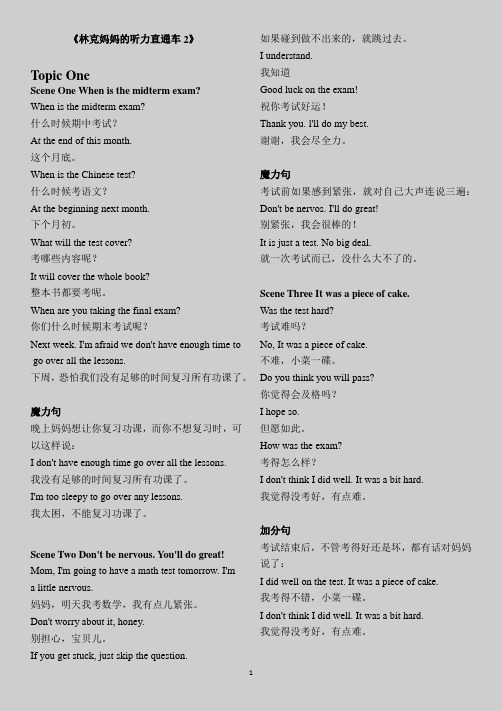
《林克妈妈的听力直通车2》Topic OneScene One When is the midterm exam?When is the midterm exam?什么时候期中考试?At the end of this month.这个月底。
When is the Chinese test?什么时候考语文?At the beginning next month.下个月初。
What will the test cover?考哪些内容呢?It will cover the whole book?整本书都要考呢。
When are you taking the final exam?你们什么时候期末考试呢?Next week. I'm afraid we don't have enough time to go over all the lessons.下周,恐怕我们没有足够的时间复习所有功课了。
魔力句晚上妈妈想让你复习功课,而你不想复习时,可以这样说:I don't have enough time go over all the lessons.我没有足够的时间复习所有功课了。
I'm too sleepy to go over any lessons.我太困,不能复习功课了。
Scene Two Don't be nervous. You'll do great! Mom, I'm going to have a math test tomorrow. I'ma little nervous.妈妈,明天我考数学,我有点儿紧张。
Don't worry about it, honey.别担心,宝贝儿。
If you get stuck, just skip the question. 如果碰到做不出来的,就跳过去。
I understand.我知道Good luck on the exam!祝你考试好运!Thank you. l'll do my best.谢谢,我会尽全力。
林克妈妈教英语
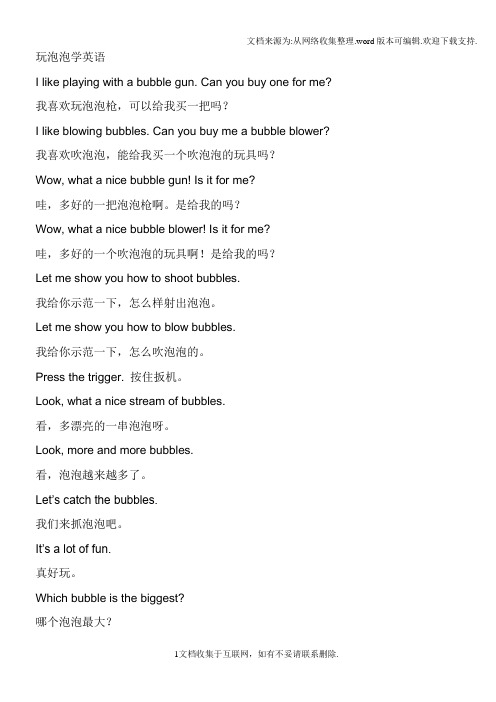
玩泡泡学英语I like playing with a bubble gun. Can you buy one for me? 我喜欢玩泡泡枪,可以给我买一把吗?I like blowing bubbles. Can you buy me a bubble blower? 我喜欢吹泡泡,能给我买一个吹泡泡的玩具吗?Wow, what a nice bubble gun! Is it for me?哇,多好的一把泡泡枪啊。
是给我的吗?Wow, what a nice bubble blower! Is it for me?哇,多好的一个吹泡泡的玩具啊!是给我的吗?Let me show you how to shoot bubbles.我给你示范一下,怎么样射出泡泡。
Let me show you how to blow bubbles.我给你示范一下,怎么吹泡泡的。
Press the trigger. 按住扳机。
Look, what a nice stream of bubbles.看,多漂亮的一串泡泡呀。
Look, more and more bubbles.看,泡泡越来越多了。
Let’s catch the bubbles.我们来抓泡泡吧。
It’s a lot of fun.真好玩。
Which bubble is the biggest?哪个泡泡最大?This one is the biggest. Oh, it’s going to pop.这个最大。
哦,它要破了。
Please don’t touch it. It will pop.别碰它,它会破的。
Don’t shoot bubbles at me.不要对着我射泡泡。
Don’t blow bubb les at me.不要对着我吹泡泡。
Mom, do you want to have a try?妈妈,你要试试吗?挠痒痒对话1:孩子:Can you fly? 你会飞吗?妈妈:Yes, I can. 我会。
英语

overweight 超重
谜底
字母c爱美的女生最害怕, 因为c能让fat变成fact(事 实)。
Page 9
Page 2
哪个字母可以唱? 哪个字母可以吃? 哪个字母可以跳? 哪个字母最快乐? 哪个字母最勤劳? 哪个字母最好学? 哪个字母人体最需要? 哪个字母可以在里面游泳? 哪个字母能让公牛消失? 哪个字母能让墨水变色? 哪个字母能“点石成金”? 哪个字母是在神奇的建筑师? 哪个字母是奇妙的助听器? 哪个字母是一把燃烧的火焰? 哪个字母爱美的女生最喜欢? 哪个字母爱美的女生最害怕? Page 3
林克妈妈英语 ---《英文三字经》
执教:东河家教中心
林克妈妈与林克的故事
林克小学的时候曾经学习很差,小学二年级期末考试她的英语甚至不 及格,林克自卑厌学。林克妈妈心里也跟刀剜了一样难受。 林克妈妈试着去找心理医生,但是林克妈妈相信:她就是小林克最好 的心理医生,她下定决心一定要帮林克提高英语成绩,帮她找回快乐和自 信。 林克妈妈是研究英语教学,对她来说教英语不是一件难事,可是林克 却怎么也不肯学,为了让林克学英语,家里天天闹得不得安宁,而且林克 妈妈还对林克吼叫,拍桌子„ 这个时候,林克妈妈就暗自说:“没有教不会的孩子,只有不会教的 老师”,“孩子, 只要你还有兴趣点,妈妈就一定为你找到突破口”。 林克喜欢儿歌,比如:小老鼠,上灯台,偷油吃,下不来„ 于是,林克妈妈也将尾音相同的单词编成英文三字经,让她轻松的记 住了发音规律和常用单词。 每每晚饭后,林克和妈妈做在沙发上,一起拍着手,欢快的唱起了: 一只mouse(老鼠),穿件blouse(女式衬衫),走进house(房间)„ 西瓜round(圆圆的),长在ground(地面),被我found(发现)„ 林克妈妈找到了教的乐趣,林克找到了学的乐趣。 这个故事,告诉我们,真正成功的教育,需要用心付出的。之后,很多 人都夸林克英语真好! ---我相信所有孩子都可以像林克一样轻松学英语,并从英语学习中获取 一份快乐和自信。
林克妈妈英语初学者指南
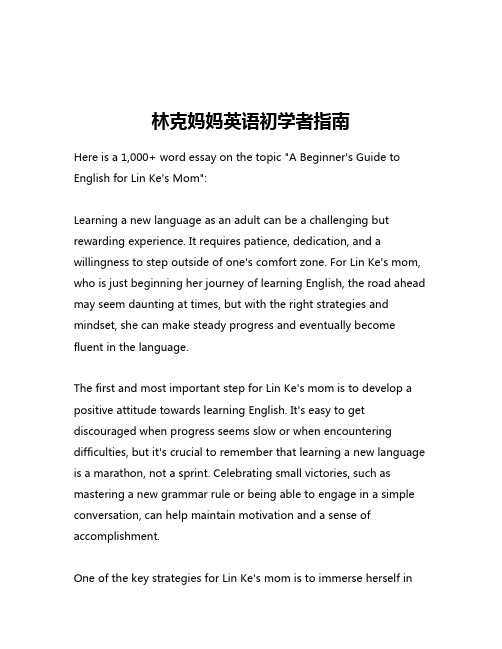
林克妈妈英语初学者指南Here is a 1,000+ word essay on the topic "A Beginner's Guide to English for Lin Ke's Mom":Learning a new language as an adult can be a challenging but rewarding experience. It requires patience, dedication, and a willingness to step outside of one's comfort zone. For Lin Ke's mom, who is just beginning her journey of learning English, the road ahead may seem daunting at times, but with the right strategies and mindset, she can make steady progress and eventually become fluent in the language.The first and most important step for Lin Ke's mom is to develop a positive attitude towards learning English. It's easy to get discouraged when progress seems slow or when encountering difficulties, but it's crucial to remember that learning a new language is a marathon, not a sprint. Celebrating small victories, such as mastering a new grammar rule or being able to engage in a simple conversation, can help maintain motivation and a sense of accomplishment.One of the key strategies for Lin Ke's mom is to immerse herself inthe language as much as possible. This can involve listening to English music, watching English movies or TV shows, or reading simple English books or articles. By exposing herself to the language in a variety of contexts, she'll become more comfortable with the rhythm, intonation, and vocabulary of English, making it easier to understand and use in conversation.Another important aspect of language learning is consistent practice. Lin Ke's mom should set aside a regular time each day to engage in English-related activities, whether it's practicing vocabulary, working on grammar exercises, or having conversations with English-speaking friends or language partners. The more she practices, the more natural and fluent her English will become.When it comes to vocabulary, Lin Ke's mom should focus on learning the most common and useful words first. This can include words related to daily activities, such as family, food, and transportation, as well as more general words that are frequently used in conversation. Building a strong foundation of core vocabulary will help her communicate more effectively and confidently.Grammar is another crucial component of language learning, and Lin Ke's mom should not shy away from it. While it may seem daunting at first, understanding the basic grammar rules of English will make it easier to construct sentences and communicate more effectively. Shecan start with simple grammar concepts, such as sentence structure and verb tenses, and gradually work her way up to more complex topics.Listening and speaking skills are also essential for language learning, and Lin Ke's mom should make a concerted effort to practice these skills. She can start by listening to English podcasts or audio books, and gradually work her way up to more challenging listening materials. When it comes to speaking, she should be willing to take risks and practice conversing with native English speakers, even if it means making mistakes. The more she practices, the more comfortable and confident she will become.Finally, Lin Ke's mom should not be afraid to ask for help and support when needed. She can seek out local language classes or find language exchange partners to practice with. Additionally, she can take advantage of online resources, such as language learning apps or online tutors, to supplement her language learning.In conclusion, learning English as an adult can be a challenging but rewarding experience. By developing a positive attitude, immersing herself in the language, practicing consistently, and seeking out support and resources, Lin Ke's mom can make steady progress and eventually become fluent in English. With dedication andperseverance, she can unlock a whole new world of opportunities and experiences.。
(音标版)林克妈妈幽默小故事L1-16
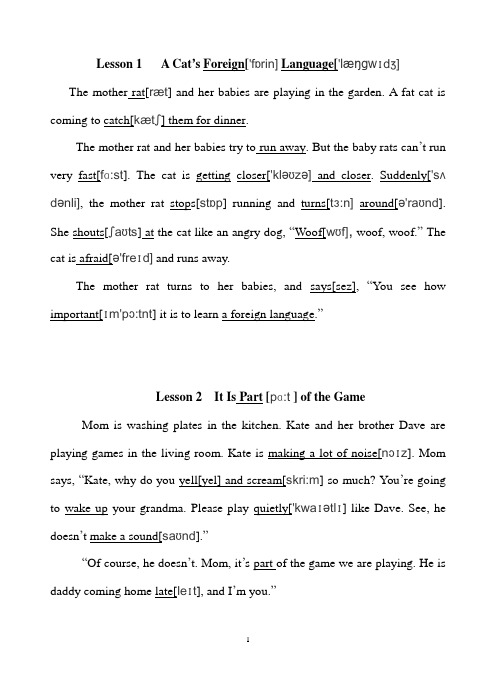
Lesson 1 A Cat’s Foreign['fɒrin] Language[The mother rat[ræt] and her babies are playing in the garden. A fat cat isThe mother rat and her babies try to run away. But the baby rats can’t runvery The cat is gettingdənli], the mother rat stops[stɒp] running andShe shouts[ʃaʊts] at the cat like an angry dog, ” TheThe mother rat turns to her babies, and says[sez], “You see how] it is to learn a foreign language.”Lesson 2 It Is Part [pɑ:t ] of the GameMom is washing plates in the kitchen. Kate and her brother Dave aresays, “’re goingto wake up your grandma. Please playdoesn’”“Of course, he doesn’t. Mom, it’s part of the game we are playing. He is’m you.”Lesson 3are good friends. They always play together [tə'geðə].’s hand, and he asks, “Who”“My grandpa,”Ben says, “and this is the best present I’vehad[hæd].”“Why?” Ted asks.“gives me five dollars ['dɒlə] for not playing with it.” Ben answers.Lesson 4 I Have His Ear [ɪə] in My Pocket ['pɒkɪt]Tim[tim]is a boy. He often with his classmates at school. nose[nəʊz]. His mother asks, “”“” Tim answers.His mother is very angry to hear this.“[ə'geɪn]?” asks his mother.Says Tim, “I have his ear in my pocket.”Lesson 5 My Dog Doesn’“Does your dog bite?”The shopkeeper says, “No, my dog doesn’t bite.”“What a nice dog,”down and tries”“”“That is not my dog.”Lesson 6Bob is an old man. He often walks his dog in the streetand comes back home at seven o’clock.get out of the car. The policeman says to Bob’“This old manHe asked me to take him home in the car.”’s wife asks, “ Bob, you go to that”“I was not lost. ’t want to go home on foot,” Bob answers.Lesson 7watching TV. Her mother asks. “Rose, what’s on TV?”“ is drinking a glass [glɑ:s] of coke [kəʊk] through [θru:] his nose.”“Stop watching that stupid ['stju:pɪd] thing. Please go to the shop andBe careful ['keəfʊl] not to chooseback home with a yellowand looks”Rose says, “I broke them all. Every one is good.”“” her mother asks.Lesson 8It’s a sunny day. A woman gets off the bus and goes into a butcherthe man turns and runs out of the shop. At that time, some policemen’s pocket. Thethank you very much. Your screamme,” the butcher says, “but how did you know he was a robber?”“I didn’t know,”the woman, “I screamed because the”Lesson 9 Just[dʒʌst] Use a PencilTom is a little boy. He is cute, but also very naughty. ['nɔ:tɪ] One evening, he eats a ballponit ['bɔ:lpɔɪnt] pen.“Excuse me, doctor, my son ate a ballpoint pen. Please come to my house at once[wʌns].”“I’m sorry, but it is too late. I’m already[ɔ:l'redi]in bed.”The doctor refuses[rɪ'fju:z] to help.“” the mother says anxiously ['æŋkʃəslɪ].“Don’t worry['wʌri], mom. You can just use a pencil,”Tom says in pain[peɪn].Lesson 10 A Smart [Answer ['ɑ:nsə(r)]Mark’s [mɑ:k] father has a farm. It’One day Mark goes to the farm with his father by car.On the farm, Mark sees many hens. He looks at the hens and a question comes to his mind[maɪnd]. He asks his father, “Why are the hens legs so short, dad?”Mark’s father smiles[smaɪl]and says, “If the hens’lesg are long, they will drop[drɒp] their eggs into['ɪntu] pieces[pi:s].”“Dad, you are so smart. You know everything['evrɪθɪŋ].” Mark says.Lesson 11 I’m the DriverWe fight [fait] our way onto[ the bus. The bus is really crowded['kra ʊdɪd]. Just then, we see a man trying to get on, but no one gives way to him.“Hey, let me get on the bus!”the man shouts.“It’s too crowded. You’d better take the next bus,” a passenger ['pæsɪndʒə(r)] says to him.“But you can’t go without [wɪ'ðaʊt] me. I’m the driver!” the man answers.Lesson 12 A Bedtime Story about BirdsIt’s time for bed. Mary takes off her skirt and puts on her pajamas [pə'dʒɑ:məz]. But she isn’t sleepy['sli:pɪ] at all. So the little girl asks her mother to tell her a very,very long story, or she is not going to bed. So her mother begins [bɪ'ɡɪn] to tell her a story like this, “There is a very big old house, and there is some rice in it. One day, a big bird goes into the house and comes out with a grain [of rice. Then another[ə'nʌðə(r)] bird goes into the house and comes out with a grain of rice. Then a third bird goes into the house and comes out with a grain of rice. Then a fourth bird… Then a fifth[“Stop, stop! I want to sleep,” Mary shouts[ʃaʊts].Lesson 13 A Bad[bæd] School Report[rɪ'pɔ:t] Ford was born[ in the year of the horse. He is a third-grade student. He likes playing sports, but doesn’t like his lessons. His father is forty years old and has a short temper ['tempə(r)]. One day, Ford gets his school report, and it is not a good one.Ford knows what will happen ['hæpən] if his farher sees the report, but he has to ask his father to sign[saɪn] it. At last, he has a good idea.In the evening, Ford turns off the light. The room is very dark. Then he gives his father the school report, and says, “Can you sign it in the dark[dɑ:k], dad?” His father says proudly['praʊdli], “Of course I can.” Ford gets what he wants.Lesson 14 The Nurse Should Give Me Some Money One day, Joe is ill. His mother takes him to the hospital. The doctor asks the nurse to give him an injection [ɪn'dʒekʃn]. Joe cries[kraɪ] for a long time.“Dear son, don’t cry. You’ll feel better after [When Joe turns around he sees his mother take out some money from her purse [pɜ:s] and give it to the nurse.Joe says angrily['æŋɡrɪlɪ] , “No, she hurt[hɜ:t]me. She made me cry. She should[ʃʊd] give me some money.”Lesson 15 A Different Roast [rəʊst] Every Day] coat and leaves home for his winter holiday. He takes a boat to a small island['aɪlənd]and wants to stay there for two weeks. But four days later['leɪtə(r)], he is back home. His mother asks why.“On the first day, a goat died, and we had roast mutton ['mʌtn] for dinner,” Jack says, “On the second day, a cow died, and we had roast beef for dinner. On the third day, a pig died, and we had roast pork for dinner.”“Very good. A different ['dɪfrənt] roast every day. ” his mother says.“On the fourth day, a farmer died, and we didn’t dare [deə(r)]to stay [steɪ]for dinner,” Jack says.Lesson 16 A Noisy ['nɔɪzɪ] Girl and Five Hundred Ducks Some girls are making a lot of noise [nɔɪz] in class. Their teacher says in a loud[voice[vɔɪs], “Stop making so much noise. A girl is really like five hundred['hʌndrəd] ducks. You are driving me mad[mæd]!”A girl student stands up and goes to the restroom['restru:m].When she comes back to the classroom, she says to the teacher, “One thousand['θaʊznd]ducks outside are waiting for you, sir.”The teacher is very surprised[sə'praɪzd] and goes out to see what it is. To his surprise, he sees his wife and his daughter standing outside the classroom.。
林克妈妈教英语

玩泡泡学英语I like playing with a bubble gun. Can you buy one for me? 我喜欢玩泡泡枪,可以给我买一把吗?I like blowing bubbles. Can you buy me a bubble blower? 我喜欢吹泡泡,能给我买一个吹泡泡的玩具吗?Wow, what a nice bubble gun! Is it for me?哇,多好的一把泡泡枪啊。
是给我的吗?Wow, what a nice bubble blower! Is it for me?哇,多好的一个吹泡泡的玩具啊!是给我的吗?Let me show you how to shoot bubbles.我给你示范一下,怎么样射出泡泡。
Let me show you how to blow bubbles.我给你示范一下,怎么吹泡泡的。
Press the trigger. 按住扳机。
Look, what a nice stream of bubbles.看,多漂亮的一串泡泡呀。
Look, more and more bubbles.看,泡泡越来越多了。
Let’s catch the bubbles.我们来抓泡泡吧。
It’s a lot of fun.真好玩。
Which bubble is the biggest?哪个泡泡最大?This one is the biggest. Oh, it’s going to pop.这个最大。
哦,它要破了。
Please don’t touch it. It will pop.别碰它,它会破的。
Don’t shoot bubbles at me.不要对着我射泡泡。
Don’t blow bubb les at me.不要对着我吹泡泡。
Mom, do you want to have a try?妈妈,你要试试吗?挠痒痒对话1:孩子:Can you fly? 你会飞吗?妈妈:Yes, I can. 我会。
林克妈妈英文三字经

林克妈妈英文三字经 Document serial number【KK89K-LLS98YT-SS8CB-SSUT-SST108】英文三字经开音节与闭音节开音节:a) 辅音+元音+辅音+e : name, bike, home, due, plane, shineb) 辅音+元音: he, go, hi, do, be, tree, three, hello闭音节:a) 辅音+元音+辅音: bad, bed, sit, hot, cup, let, mad, mapb)元音+辅音: it, is, of, in, on, up, out, ant重读音节:单词中发音特别响亮的音节。
开、闭音节歌开音节,音节开,一元字母在后排;不怕一辅堵后门,还有哑e在门外。
a, e, i, o, u,就读/ei/,/i:/,/ ai/,/u/,/ju:/。
闭音节,音节闭,一元字母生闷气;辅音字母堵后门,一元字母音短急。
a, e, i, o, u,要读//,/e/,/ i/,//,//。
元音元音:发音时声带振动,呼出的气流通过口腔时不受阻碍,这样形成的语音称为元音。
单元音的分类前元音:/ i: /, / i /, / e /, //发音时舌位最高点都在舌前部。
中元音:/ : /, / /发音时舌位最高点都在中部,舌尖都要轻触下齿或者稍离下齿龈。
后元音:/ ɑ:/, / /, / :/, / u /, / u: /, /Λ/发音时舌位最高点都在后部,舍身都要后缩,舌尖都要离开下齿龈。
双元音的分类合口双元音:/ ei /, / ai /, / u /, / au /, / i/牙床从开到合,前一个元音发得较清楚,较长,后面的元音发得较模糊,较短。
集中双元音:/ i /, / ε /, / u /两个元音发音都比较清楚,分别从[i],[e],[u]集中到中元音[]。
辅音辅音:不论声带振动与否,发音时呼出的气流通过口腔或鼻腔时受到一定的阻碍,这样形成的语音称为辅音。
- 1、下载文档前请自行甄别文档内容的完整性,平台不提供额外的编辑、内容补充、找答案等附加服务。
- 2、"仅部分预览"的文档,不可在线预览部分如存在完整性等问题,可反馈申请退款(可完整预览的文档不适用该条件!)。
- 3、如文档侵犯您的权益,请联系客服反馈,我们会尽快为您处理(人工客服工作时间:9:00-18:30)。
玩泡泡学英语I like playing with a bubble gun. Can you buy one for me? 我喜欢玩泡泡枪,可以给我买一把吗?I like blowing bubbles. Can you buy me a bubble blower? 我喜欢吹泡泡,能给我买一个吹泡泡的玩具吗?Wow, what a nice bubble gun! Is it for me?哇,多好的一把泡泡枪啊。
是给我的吗?Wow, what a nice bubble blower! Is it for me?哇,多好的一个吹泡泡的玩具啊!是给我的吗?Let me show you how to shoot bubbles.我给你示范一下,怎么样射出泡泡。
Let me show you how to blow bubbles.我给你示范一下,怎么吹泡泡的。
Press the trigger. 按住扳机。
Look, what a nice stream of bubbles.看,多漂亮的一串泡泡呀。
Look, more and more bubbles.看,泡泡越来越多了。
Let’s catch the bubbles.我们来抓泡泡吧。
It’s a lot of fun.真好玩。
Which bubble is the biggest?哪个泡泡最大?This one is the biggest. Oh, it’s going to pop.这个最大。
哦,它要破了。
Please don’t touch it. It will pop.别碰它,它会破的。
Don’t shoot bubbles at me.不要对着我射泡泡。
Don’t blow bubb les at me.不要对着我吹泡泡。
Mom, do you want to have a try?妈妈,你要试试吗?挠痒痒对话1:孩子:Can you fly? 你会飞吗?妈妈:Yes, I can. 我会。
孩子:Can you show me how to fly? 能给我示范一下怎么飞吗?妈妈:Of course, I can. Look at me. 我当然能啦,看着我。
孩子:Tickle, tickle, tickle. 胳肢啦,胳肢啦!(挥手做挠痒痒状,下同)妈妈:Please don’t tickle me. I’m ticklish. 请别胳肢我,我怕痒痒。
对话2孩子:Can you swim? 你会游泳吗?妈妈:Yes, I can. 我会。
孩子:Can you show me how to swim? 能给我示范一下怎么游泳吗?妈妈:Of course, I can. Look at me. 我当然能啦,看着我。
孩子:Tickle, tickle, tickle. 胳肢啦,胳肢啦!妈妈:Please don’t tickle me. I’m ticklish. 请别胳肢我,我怕痒痒。
对话3孩子:Can you dance? 你会跳舞吗?妈妈:Yes, I can. 我会。
孩子:Can you show me how to dance? 能给我示范一下怎么跳舞吗?妈妈:Of course, I can. Look at me. 我当然能啦,看着我。
孩子:Tickle, tickle, tickle. 胳肢啦,胳肢啦!妈妈:Please don’t tickle me. I’m ticklish. 请别胳肢我,我怕痒痒。
对话4:孩子:Where are you most ticklish? 你哪儿最怕痒痒呢?妈妈:I’m ticklish under the arm.我胳肢窝怕痒痒。
孩子:Watch out! I’m going to tickle you under the arm. 注意!我要挠你胳肢窝啦。
(挥手做挠痒痒状,下同)妈妈:Please, please stop. I can’t take it any more. 请你停下吧,我受不了了。
对话5孩子:Where are you most ticklish? 你哪儿最怕痒痒呢?妈妈:I’m ticklish around the neck.我脖子怕痒痒。
孩子:Watch out! I’m going to tickle you around the neck.. 注意!我要挠你脖子啦。
妈妈:Please, please stop. I can’t take it any more. 请你停下吧,我受不了了。
对话6孩子:Where are you most ticklish? 你哪儿最怕痒痒?妈妈:I’m ticklish be hind the knees. 我膝盖弯儿怕痒痒。
孩子:Watch out! I’m going to tickle you behind the knees. 注意!我要挠你膝盖弯儿啦。
妈妈:Please, please stop. I can’t take it any more. 请你停下吧,我受不了了。
日常Too much homework. I can’t stand it.作业太多,真受不了。
(每周用语)I have no written homework for today. Only reading and learning by heart.今天没有写的作业,只有朗读和背诵。
(每周用语)I have to write a diary today. Nothing to write about.今天要写日记,可实在没什么好写的。
(写完作业必用语)Mom, please sign my homework journal.妈妈,请在记事本上签个字吧。
(经常性用语)I’m out of pencil lead.铅笔芯用完了。
(每天必用语)I don’t like pencils. Too much sharpening.我不喜欢铅笔,老得削。
(整理书包必用语)Let me check the timetable. Put in only what I need for tomorrow.我来对照一下功课表,只放进明天需要的。
魔力句子一:It’s dinner time, not lecture time. (这是晚饭时间,不是听批评的时间。
)或Don’t turn dinner time into lecture time. (或:不要把晚饭时间变成批评时间。
)魔力句子一:It’s dinner time, not lecture time. (这是晚饭时间,不是听批评的时间。
)或Don’t turn dinner time into lecture time. (或:不要把晚饭时间变成批评时间。
)魔力句子三:Tomorrow is Saturday. I want to sleep late. Don’t wake me up.(明天是周六,我想睡个懒觉,别叫醒我哦。
)魔力句子四:May I keep the change?(找来的钱可以归我吗?)场景一作业量:减负减负,越减越重I’ve lots of homework. Look at my homework journal.我有很多作业,看看我的记事本吧。
—What’s the homework for today? 今天有什么作业?—I’ve lots of homework. Look at my homework journal.我有很多作业,看看我的记事本吧。
—Chinese, math, English and something else. 语文、数学、英语,还有点别的。
注:journal(美国英语)日记,相当于diary(英国英语),homework journal(用来记作业的)记事本,也称“家校联系本”。
—Mom, I have no homework for today!妈妈,我今天没作业啦!—Let me check your homework journal. No written homework, but you have “reading”and “memorization”.让我看一下你的记事本。
没有书面作业,但有“朗读”和“背诵”作业呀。
—“Reading” and “memorization” aren’t real homework.“朗读”和“背诵”不是真正的作业。
—But they need to be done well, too. 但也要好好完成的哦。
注:check 检查 written书面的 memorization背诵(动词为memorize)—Mom, I have too much homework. I can’t stand it. 妈妈,我作业太多了,忍无可忍了。
—Stop complaining. Let’s get down t o work. 别抱怨了,赶紧做吧。
注:homework是不可数名词,“很多”要用much。
stand忍受,站立complain抱怨get down to work 开始工作场景二语文作业:日记日记真头疼I hate diaries. Nothing to write about.我讨厌日记,没什么可写的。
—Mom, I have a diary to write for my homework again. 今天又有写日记的作业了。
—To keep a diary is good for you. 记日记对你有好处呀。
—But I can’t find anything to write about. Every day is the same.但我没什么可写的,每天都一样的事。
注:注意本对话中两个介词for的用法keep a diary写日记(英国英语) keep a journal 写日记(美国英语)—I can’t learn this poem by heart. 这首诗我背不下来。
—Take it easy. You can read it first. 慢慢来,你可以先读一读。
—Can you first explain the poem to me?你能先给我解释一下这首诗的意思吗?注:learn sth. by heart 记住,背诵 poem诗歌Take it easy. 慢慢来,别着急。
explain解释—May I ask you a question? 我可以问你一个问题吗?—Sure, go ahead. 当然可以了,问吧。
